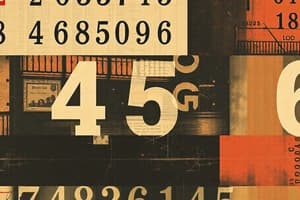Podcast
Questions and Answers
What is the standard deviation used to measure?
What is the standard deviation used to measure?
What does standard deviation measure with respect to the average?
What does standard deviation measure with respect to the average?
How do the average, median, and standard deviation change when the same number is added to each data value?
How do the average, median, and standard deviation change when the same number is added to each data value?
What happens to the average, median, and standard deviation when each data value is multiplied by a positive number?
What happens to the average, median, and standard deviation when each data value is multiplied by a positive number?
Which measure of spread remains the same when the same number is added to each data value?
Which measure of spread remains the same when the same number is added to each data value?
What happens to the average, median, and standard deviation when all original scores are multiplied by a certain number?
What happens to the average, median, and standard deviation when all original scores are multiplied by a certain number?
What is the average of a set of numbers?
What is the average of a set of numbers?
What does the median measure?
What does the median measure?
In what scenario would the median be more appropriate than the average?
In what scenario would the median be more appropriate than the average?
What is an outlier in a set of data?
What is an outlier in a set of data?
In what way is the mean different from the median?
In what way is the mean different from the median?
What do service centers with the same mean and median for repair time but differing in spread illustrate?
What do service centers with the same mean and median for repair time but differing in spread illustrate?
Flashcards are hidden until you start studying
Study Notes
- The text discusses summarizing data through the concepts of average and standard deviation.
- The average is a measure of the middle or center of a set of numbers, found by adding all values and dividing by the number of values.
- The median is another measure of the middle, with half of the data values being less and half greater than the median.
- To find the median, arrange the numbers in order and find the middle number (for odd numbers of values) or the average of the two middle numbers (for even numbers).
- The text discusses the difference between average and median, with the average being sensitive to outliers or extreme values, while the median is not.
- An outlier is a data point that does not fit with the rest of the data.
- The text provides examples to illustrate concepts, including calculating averages and medians for different data sets.
- The text discusses the relationship between the average and median in different types of distributions, including those with long right or left tails.- The median and mean (average) have different roles in measuring data: median measures the center of data when the data is not symmetric and mean is the most common way to measure data spread.
- The text provides examples of data sets from two different service centers.
- Both service centers have the same mean and median for the repair time, but they differ in spread.
- The text introduces various measures of spread including percentiles, interquartile range, range, and standard deviation.
- Standard deviation is used to measure the amount of variability in data.
- Standard deviation is computed by first calculating the average, then finding the deviations from the average, squaring the deviations, finding the average of squared deviations, and finally taking the square root of the average squared deviations.
- Standard deviation measures how far each value is from the average.
- When adding the same number to each data value, the average and median also change by that number, but the standard deviation remains the same.
- Multiplying each data value by a positive number multiplies the average, median, and standard deviation by that number.
- The average, median, and standard deviation all have the same meanings (units) as the original data.
- In an example, if the data is about quiz scores out of 10 points, the average is 5 points, median is 6 points, and standard deviation is 1.2 points. If everyone is given three extra points, the new average is 8 points, median is 9 points, and standard deviation remains 1.2 points. If all the original scores are multiplied by 10, the new average is 50, median is 60, and standard deviation is 12.
Studying That Suits You
Use AI to generate personalized quizzes and flashcards to suit your learning preferences.



